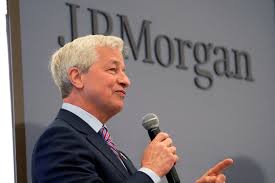Brand Reputation: Returning to Office
Payton Costenbader
Marketing Editor
President of the United States, Donald Trump has recently enforced a return to office mandate for government workers that is inspiring companies across the nation to follow suit. The Return to Office mandate has one goal, enforce in-person labor and eliminate the work from home culture that the Covid-19 pandemic has popularized. The work from home culture includes hybrid work models, that is 2-3 days in the office and 2-3 days working from a home office setup each week. The new mandate wants to bring workers back into the office for the full five day work week. This dramatic change of office culture has had a monumental effect on the appeal of a company’s brand.
Banks, accounting firms, and other service companies are in constant competition to appeal to clients and win over their favor, this means adapting wherever possible to stand out. JPMorgan Chase & CO CEO, Jamie Dimon, can be quoted stating that he is looking for more “hustle” within his company; to begin that journey he has mandated that his employees return to their five day in office work week. He is aiming to improve the efficiency of his labor force and better satisfy client needs. He stated during a company town hall meeting in February, “You have a free market. You can do one thing, I can do another. That’s what’s called a free market.” Implying that he does not feel persuaded by other financial institutions continuing their hybrid work model. From Dimon’s experience, the work from home model is not effective for work efficiency. He explained that there was, “not a God-d*mn person” that was active for a Friday business call, though they were supposed to be available at home to dial in. He does not discount where this model does work, also stating that JPMorgan Chase has effective virtual call centers that are staffed with full-time remote workers, but does not see it as fitting for the entire company.

Adapting his employees work model to fit the changing market demand from clients is an effective way to improve efficiency and his brand reputation, but what are the consequences if all offices enforce this mandate? The people of America could face much more traffic during commutes or packed public transportation. The IRS is reporting that they are struggling with the return to office mandate as they do not have enough desks in their buildings to accommodate everybody working in-person. Those who do not live in cities or urban areas would have to face long and expensive commutes, or move closer to the office. The already limited housing market could not support thousands of American’s moving to a commutable distance from metropolitan areas. These negative effects of the mandate will be detrimental to the appeal of working at the companies enforcing it. Companies enforcing this mandate will have to find new and creative marketing techniques to bring back the appeal of working in the client services industry, which can become a huge burden on their budget.
There is much to consider when deciding if bringing employees back to the office would have an overwhelmingly positive or negative impact; and those results are not mutually exclusive. A CEO may see improvement in work being finished, but a massive decline in employee satisfaction. It is important to consider more than the financial and client perspective of a company’s brand, but also to consider the people that create that organization.
Contact Payton at costenpa@shu.edu

